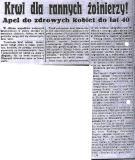National Content: Poland
Blood for the Wounded Soldiers The Appeal to Healthy Women Aged up to 40 years.
| Source | “Express Poranny” no. 244 04.09.1939 |
| Event referred to | Wehrmacht’s Invasion on Poland |
| Technological characteristics | Type of file: text Extension: pdf Dimension of the file: 178 kB Availability proposed: pdf document with zoom options |
| Description of the source | Kind of source: Newspaper article Origin of the source: Archive of the library of the University of Gdansk (PL) Language: polish Copyright issues: reproduction and pedagogical exploitation authorized in the framework of the MHM project |
| Contextualisation of the source | “Express Poranny” was a source of very precise information for Polish people. It was treated with a noticeable respect by the Polish community. |
| Interpretation of the source | The source shows a very important question of co- operation between the civil people and the army. It is a kind of a vivid communication with a society, showing the importance of institutions helping the army, let us say: transmitting the civilian services into the army’s domain. The women as a social group of citizens is taken into consideration as a new subject of the Polish patriotism |
| Original Contents | Krwi dla rannych ¿o³nierzy! Apel do zdrowych kobiet do lat 40 W obliczu wypadków wojennych uruchomiono w stolicy oœrodki rejestruj¹ce chêtnych, którzy w razie potrzeby mog¹ staæ siê dostarczycielami krwi. Transfuzja krwi oddaje nieocenione us³ugi armii w czasie wojny, tym bardziej, ¿e postêpy medycyny pozwalaj¹ na konserwowanie krwi i przewo¿enie jej nawet na du¿e odleg³oœci. Np. na teren wojenny w Hiszpanii dowo¿ono krew ze Szwajcarii. Przed pobraniem krwi dawca musi byæ wszechstronnie zbadany i zupe³nie zdrowy. Musi przejœæ badania na grupê krwi. Przestrzeganie bowiem przynale¿noœci grupowej zapewnia zupe³ne bezpieczeñstwo przetaczania. Istniej¹ cztery grupy krwi tzw. grupa A, grupa B, grupa AB, grupa 0. Dawcy, którzy posiadaj¹ grupê 0 s¹ to tzw. dawcy uniwersalni, których krew mo¿e byæ przetoczona dla ka¿dej grupy. Krew mo¿e byæ zakonserwowana, co jest wielkim udogodnieniem dla lekarza i chorego, gdy¿ skraca czas wyczekiwania na transfuzjê, tak drogi zw³aszcza w nag³ych wypadkach. Wed³ug badañ najwybitniejszych uczonych – stwierdzonych licznymi doœwiadczeniami – oddanie krwi nie przynosi ¿adnego uszczerbku dla zdrowia dawcy. W myœl prawa biologicznego wszelkie straty krwi wynagradzane s¹ z nadmiarem i ofiara ta pobudza m³ody i zdrowy organizm do szybszego rozwoju. W obecnej chwili akcja ta zas³uguje na specjalne poparcie. Ka¿dy krwiodawca spe³nia ¿o³nierski obowi¹zek. We Francji i Anglii istniej¹ ju¿ od dawna oœrodki bezinteresownych krwiodawców, którzy oddaj¹ swoj¹ krew rannym i wykrwawionym na froncie ¿o³nierzom. Organizacja Przysposobienia Wojskowego Kobiet wyda³a apel do swych cz³onkiñ i w ogóle do wszystkich zdrowych kobiet w wieku od lat 20 do 40 mog¹cych ofiarowaæ swoj¹ krew, aby zg³asza³y siê ochotniczo jako bezp³atne krwiodawczynie dla ¿o³nierzy. Oœrodek badania i rejestracji ofiarodawczyñ PWK uruchomiony od dnia dzisiejszego we wtorki, czwartki i soboty w ambulatorium kliniki dzieciêcej w Warszawie, Marsza³kowska 24, w g.17 – 19. Poza tym ju¿ s¹ czynne codziennie nastêpuj¹ce oœrodki rejestracyjne Centralnego Instytutu Przetaczania Krwi Polskiego Czerwonego Krzy¿a: oœrodek rejestracji krwiodawców PCK, al. Ujazdowskie 37, w godz. 8 – 12, przy Kole Medyków Uniw. J. Pi³sudskiego, Dom Medyków, ul. Oczki (przede wszystkim dla akademików), oraz w centralnym instytucie przetaczania krwi PCK, Smolna 6 w godz. 8.30 – 11.30. |
| Original Contents (English Translation) | Blood for the Wounded Soldiers The Appeal to Healthy Women Aged up to 40 years When facing with the war accidents, there were set on in Warsaw the centres registering volunteers, who in case of help needed could be suppliers of blood. The blood transfusion expresses great dedication on the side of the army during the war, remembering the fact that the progress in medicine let for preserving the blood and transporting them even within long distances, the example being transporting blood to Spain from Switzerland. Before taking blood, the supplier must be examined in every detail and completely healthy. Ordering the rules of the blood group participation provides a total safety of transferring the blood. There are 4 blood groups: so- called A group, B, AB and 0. The givers who possess 0-group are so-called universal givers whose blood can be transferred to any other group. The blood can be preserved, which is very comfortable for a doctor and for a patient, since that shortens a period of time dedicated to waiting for a transfusion- so precious especially in sudden accidents. According to the studies by the most eminent scientists- giving blood do not bring any problem to a giver’s health. According to the biological rules, all the blood’s losses are overcompensated and such a dedication awakes a young and vigorous organism towards a faster progress. In France and in England, there have been existed for a long time the centres of blood givers who give their blood to the wounded and bled out at a warfront soldiers. The Organization of the Women’s Military Training has announced the appeal towards its members and towards all the healthy women aged 20-40 in which it wants them to give their blood as volunteers to the soldiers. The Centre of Studying and Registering (PKW) was set up today- and it will be in service on Tuesdays, Thursdays and Saturdays in the Ambulance Quarter for Children in Warsaw- Marszalkowska Street 24, in hours: 5-7 p.m. Apart from that there function every day the following registering centres of the Central Institute of Blood transferring of the Polish Red Cross: Ujazdowskie Avenue 37, in hours: 8-12 a.m., by the Medical Circle in the Jozef Pilsudski University- The Medical House- Oczki Street (first of all for the academics), and in the Central Insitute of Blood Transferring- Smolna Street 6, in hour: 8.30-11.30. |
